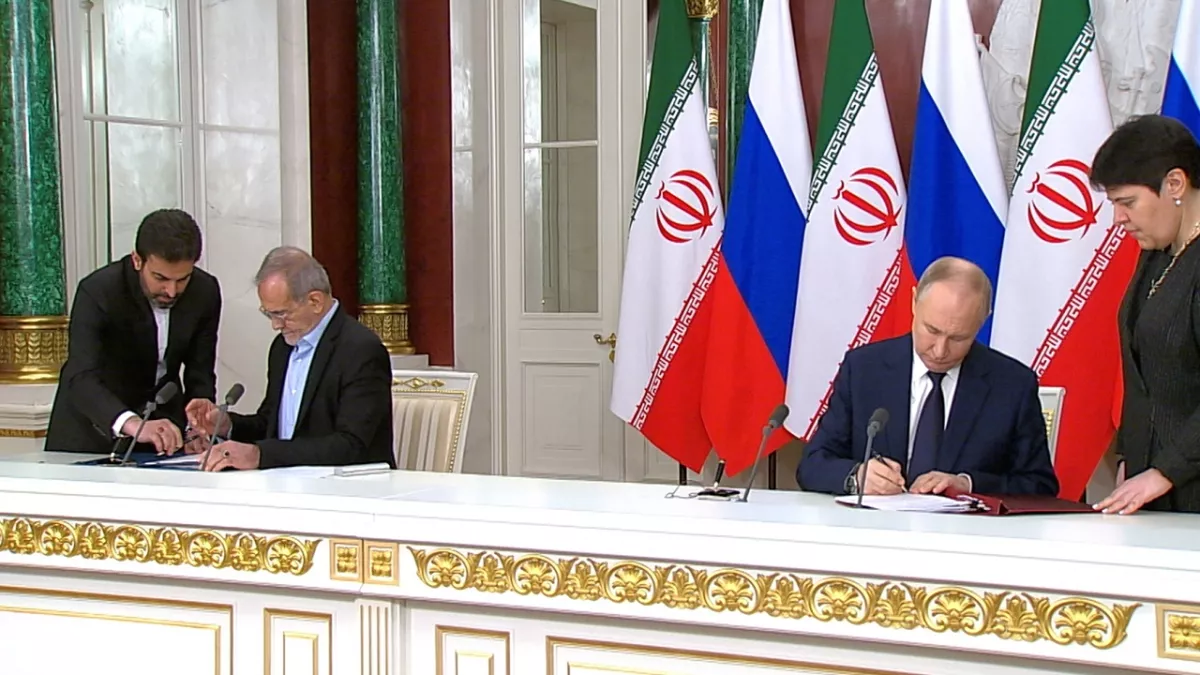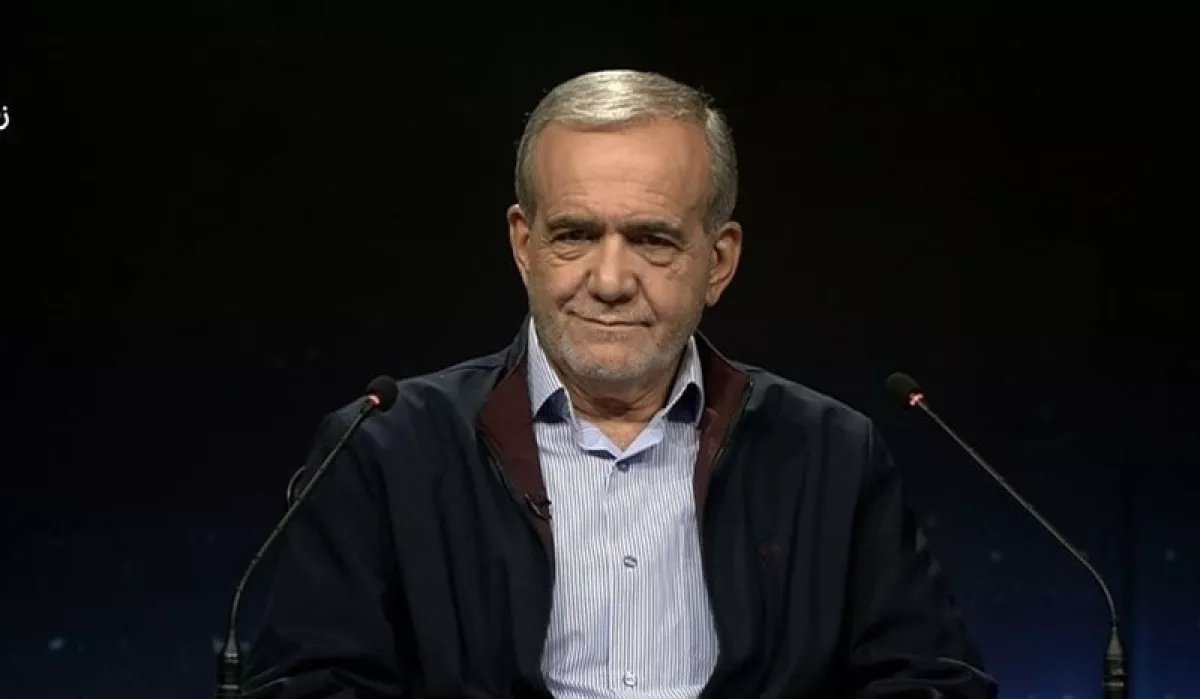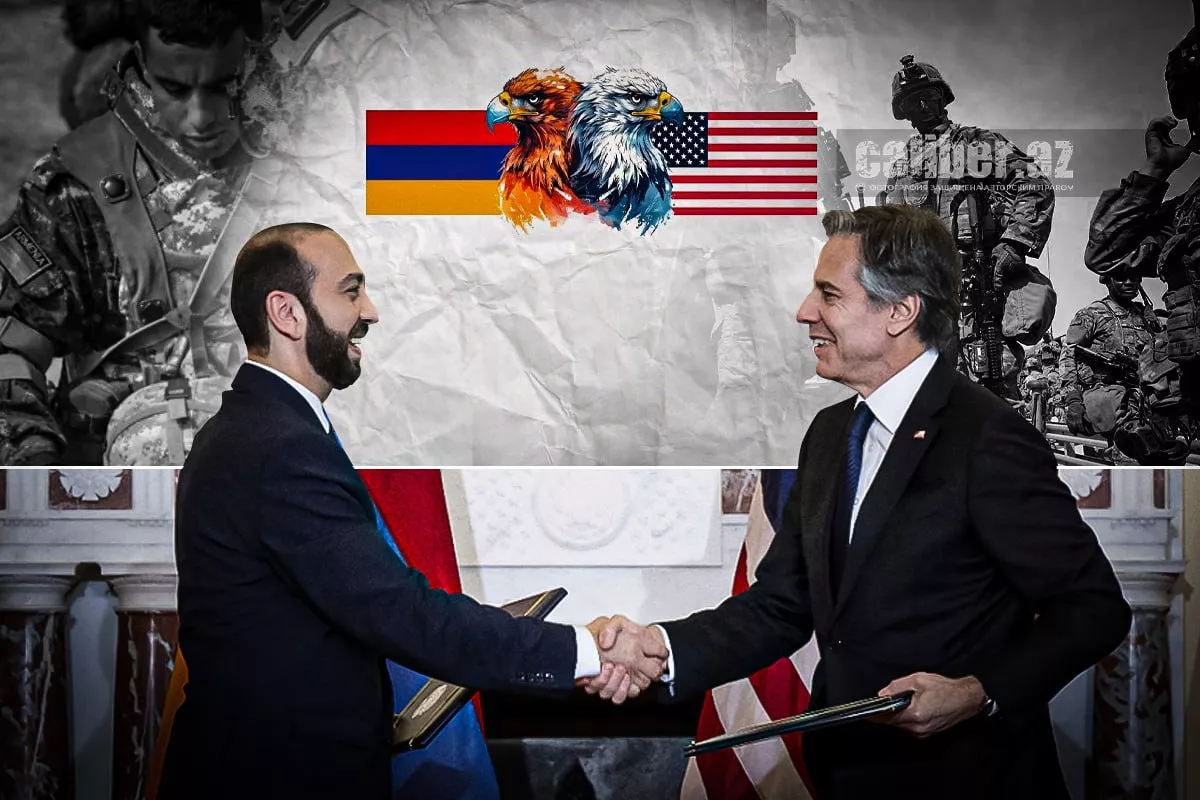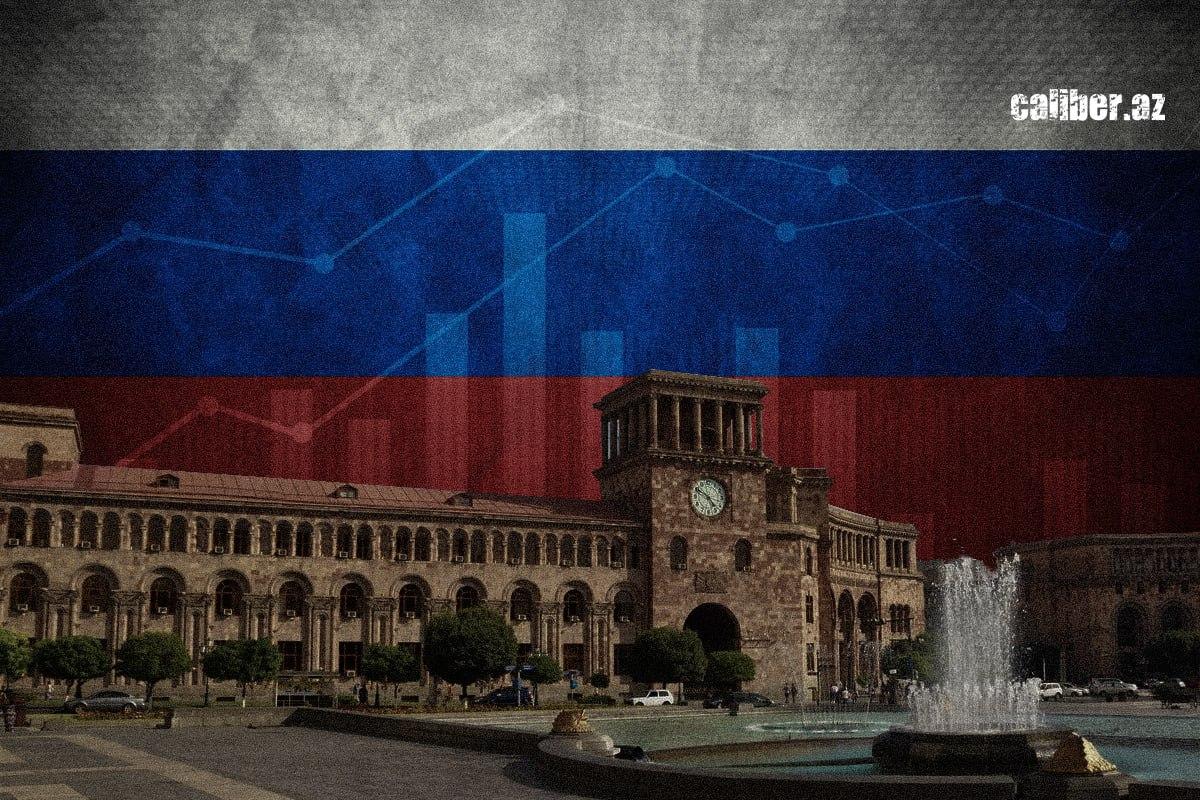Global fire sale: Declarations and intrigues of the superpowers Armenia’s high-stakes gamble
Last week, the United States and Russia raced to outmanoeuvre each other, with both superpowers striving to assert their influence. Meanwhile, their respective partners seized the opportunity to extract promises and concessions in the form of strategic agreements. The results of these diplomatic manoeuvres were formalized through the Armenian-American and Russian-Iranian partnership pacts. However, the prospects for implementing these agreements remain uncertain, and their contents raise a number of pressing questions.
Moscow and Tehran’s strategic projects
On January 17, Russian President Vladimir Putin and Iranian leader Masoud Pezeshkian signed a Comprehensive Strategic Partnership Agreement at the Kremlin in a highly ceremonial atmosphere. Yet, several details of the agreement suggest that the partnership between Russia and Iran is far from straightforward. The tone of the negotiations signals a willingness for flexibility, implying that further discussions and adjustments may follow.
For instance, when the Iranian president arrived at the airport, his welcome was at a respectable, but not exceptional, level. He was greeted by Russia's Minister of Energy, who also serves as the co-chairman of the Russian-Iranian Commission for Trade and Economic Cooperation. While this is a significant role, it is notable that foreign heads of state are often greeted by higher-ranking officials, such as prime ministers or even fellow heads of state, especially when crucial matters are at stake.
In this case, the signing of the Strategic Partnership Agreement, as noted by the Russian president, was the result of long-term negotiations. "We have been working on it for a long time, and I am pleased that this work has been completed," he remarked. The process, which began in January 2022, finally led to a draft document suitable for signing. However, the agreement, despite being in the works for much longer, appears modest in scope. This suggests that both sides were cautious about rushing to finalize it, despite an initial agreement in July, fully aware that the outcome would not be particularly groundbreaking.

Currently, when discussing the agreement, the Russian side emphasizes the development of trade and economic relations, the construction of nuclear power plants, and consultations on international issues. These are all topics that can easily be found on the agenda of relations between any two relatively close countries. However, more strategic initiatives between Russia and Iran have not been mentioned. Although there were such initiatives in the past — one can recall the "gas OPEC" project, which would have allowed gas-exporting countries to jointly defend their interests in international markets. Another example is the Russian and Iranian intervention in Syria. Or perhaps it’s better not to mention that? After all, the Iranians have always been quick to emphasize that their intervention had nothing to do with Russia’s. Furthermore, everything in Damascus collapsed just before the signing of the infamous Strategic Partnership Agreement.
In short, the question should be put bluntly: do Moscow and Tehran really want to build a full-fledged strategic partnership, or are they simply using an attractive label to rebrand otherwise standard relations? There are reasons to believe that it is indeed the latter. Moscow and Tehran undoubtedly want to benefit from the new agreement, but more likely in their separate relations with third countries. Moreover, the parties clearly do not fully trust each other when it comes to the good-faith use of this document. This is evident not only from how quickly it was made public — presumably to prevent any potential manipulations. It is primarily clear because, although nearly half of the agreement deals with security matters, one of its provisions states that if one of the parties is attacked by a third party, the partner under the agreement is not obligated to assist. They are only prohibited from helping the aggressor. Such a curious provision was not even present in the rather restrained strategic cooperation agreement between Russia and North Korea, which, in case of an attack, provides for the immediate coordination of practical measures to render military assistance to each other.
Partnership based on distrust
The negotiations and agreements accompanying the signing of the Strategic Cooperation Agreement could have supported the document with some breakthrough decisions, but there were none. Judging by the remarks of Iranian representatives, the main issue for them was supposed to be agreements on the construction of additional energy blocks at the Soviet-era-designed nuclear power plant in Bushehr, and even the Russian president referred to energy as the most important area. However, even with the Bushehr deal, things are not going smoothly — the implementation has been postponed to a later date.
Nevertheless, a couple of potentially strategically significant projects were discussed. Firstly, the gas pipeline project from Russia to Iran was announced a year ago. Moscow is not in a hurry with it; Putin even called for restraint in relation to this idea, suggesting that the supplies should start with a minimal volume of up to 2 billion cubic meters, with a subsequent goal of reaching 55 billion cubic meters per year.
Secondly, there was a discussion of what is potentially the most important current strategic initiative — the development of the "North-South" transport corridor, especially since a railway line is currently being built from Iran's Rasht to the Azerbaijan border in Astara, which will enhance shipments along the route between the Persian Gulf and Russia. Ideally, this could strategically unblock Russia, whose access to the sea in the Eastern European region is currently complicated by NATO actions, and also shift Russia’s development focus southward. However, there has been no significant progress here either. As President Putin acknowledged at a press conference: "There are always difficulties with one project [the gas pipeline], with the second [the transport corridor], and with all the others."
Moreover, the Russian and Iranian sides spoke about the closeness of their positions on international issues. The main such issue is the confrontation with the West, which has forced their opponents to at least interact in some way. However, it seems that both Russia and Iran are looking for ways to reduce the intensity of such a confrontation, and are not averse to doing so at each other's expense. Fortunately, there are precedents for this. In the past, Russia has supported Western sanctions against Iran — both openly (through the UN) and covertly, simply halting supplies. Iran is also skilled at playing such games, as evidenced by its recent efforts to help the West redirect Armenia away from Russia and towards the EU.

In short, the Strategic Partnership Agreement between Russia and Iran currently holds more tactical significance for both parties. It is yet another card in their negotiations with third parties, primarily the West. Its signing is yet another move in the chess games that Moscow and Tehran are simultaneously playing with the collective West.
How Pashinyan bought Biden
However, it wasn’t just Russia and Iran who hurried to position their pieces before the start of a new game involving Trump. The leadership of Armenia and the Western liberal establishment were also eager to present the new American leader with a fait accompli — a scheme that would force Trump to support the Armenian nationalists in their revisionist plans. To achieve this, on January 9, Pashinyan’s government orchestrated a loud show around the approval of the "bill on the commencement of the EU accession process," which was essentially a rough bureaucratic draft. Its purpose (as well as the scandal created by the Armenian prime minister at the pre-New Year meeting of the EAEU) was unclear — after all, Pashinyan’s government itself acknowledges that a referendum must still be held to determine whether the Armenians actually wish to join the EU.
Last week, the purpose became clearer — the Armenian leadership was demonstrating its pro-Western orientation in order to convince the U.S. of the need to sign the Charter of Strategic Partnership with Armenia. This was indeed done on January 14, during the visit of Armenian Foreign Minister Ararat Mirzoyan to the U.S.

The document signed by him resembles the Russian-Iranian agreement: a hastily prepared political declaration with an attention-grabbing title and minimal substance. It declares the intention to develop cooperation in the fields of politics, security, economy, science, and culture, but no program of activities is attached. The document also promises assistance to Armenia in implementing military and economic reforms, but it does not include guarantees of American aid in the event of an armed conflict. The framework agreement has not been supplemented by additional agreements — only a partnership commission has been established, negotiations on a nuclear energy agreement have begun, and the U.S. side promised to send a delegation from the U.S. Customs and Border Protection to Yerevan. To put it mildly, it’s rather sparse, given the bold title.
The minimalism of the Armenian-American Charter can also be explained by the fact that Yerevan and Washington began urgently moving towards "strategic cooperation" in June, following an agreement at the intergovernmental meeting of the Armenian-American Strategic Dialogue. Pashinyan immediately took the bull by the horns, and even while sending a congratulatory message to Biden on U.S. Independence Day on July 4, he included his readiness to sign the corresponding document before the end of Biden’s presidential term — clearly hinting at the Armenian diaspora’s votes as the price for Biden. As for how Biden and Pashinyan then crafted the Armenian-American strategic partnership, it resembles the famous joke about Lieutenant Rzhevsky. When Rzhevsky’s fellow hussars once refused to bathe their horses in champagne — in a fit of hussar bravado — citing a lack of money, the lieutenant suggested a minimalist alternative: pour beer over a cat instead. Pashinyan and Biden essentially did something similar.
Chasing after a high-profile document with minimal substance, the Armenian side made yet another political misstep. Ignoring the signs of an impending defeat for the "Democrats" in the U.S. presidential elections, it firmly aligned itself with the Democratic Party and attempted, through the outgoing Biden administration, to impose a specific framework for relations with Armenia and supporters of Armenian nationalist revanchism on the Republican administration of Trump. Although the Armenian diaspora will likely attempt to mitigate this blunder with the help of European allies, it’s clear that Trump will view the “strategic partnership” crafted in just six months by his staunch political adversaries with considerable scepticism.
Moreover, Pashinyan's troubles with Trump are just beginning. Engaging in dialogue with the new U.S. administration will be challenging for Armenian representatives for several reasons, three of which stand out.
First, Armenia’s decision to align itself against Israel in recent years, despite clear signs of Netanyahu’s growing influence within the U.S. political establishment, will complicate relations. While Yerevan tried to sidestep this issue during the signing of the Strategic Partnership Charter and present itself as a loyal ally of the U.S.—for instance, by declaring its intention to join the global coalition to fight ISIS—such moves come off as political anachronisms. It’s akin to announcing membership in the anti-Hitler coalition long after its relevance.
Second, the Armenian government will struggle to justify its unacceptable ties with Russia, which conflict with its aspirations to integrate into Western structures. Pashinyan’s antics at CSTO and EAEU summits, along with his veiled threats to Putin, cannot conceal the facts: Armenia’s trade turnover with Russia has grown exponentially, bypassing Western sanctions, while the country continues to host a significant Russian military presence—far larger than in Belarus, Moscow's official ally.
Third, the ongoing intrigues of the Armenian establishment with Iran further complicate matters. Yerevan has been trying to secure military guarantees from Tehran in exchange for assisting Iran in establishing better ties with the West. However, Trump and Netanyahu have made no secret of their intention to increase pressure on Tehran, and one promising avenue of such pressure could involve shutting down Armenia's "window to the world" for Iran. Should this strategy be pursued, it could result in a geopolitical fallout that crushes Pashinyan's ambitions.
Pashinyan on a short leash
This raises a pertinent question: are Armenian politicians truly unaware of these dynamics, or are they simply unable to address them effectively? They are likely aware but face significant challenges in resolving these issues given Armenia's current political and economic constraints. A country that relies on Russia for 70% of its essential goods cannot simply cater to every demand from its Western partners while ignoring Moscow's reactions.

Russia's discontent with Armenia's recent actions is becoming increasingly apparent. Recently, Russian Foreign Minister Sergey Lavrov expressed bewilderment over the deployment of an EU quasi-military mission to "ensure security" in southern Armenia. Simultaneously, Russian Deputy Prime Minister Alexey Overchuk and Kremlin Spokesman Dmitry Peskov stated that Armenia cannot reconcile membership in both the EU and the Eurasian Economic Union (EAEU). Additionally, several Russian officials voiced scepticism about the substance of the Armenia-U.S. Strategic Partnership Charter. However, the latter has caused less concern in Moscow, perhaps due to an understanding that Trump's potential return to power might render the document largely irrelevant.
Aware of its fragile ties with Western powers and increasingly strained relations with Russia, Pashinyan has embarked on a precarious path. His attempt to reorient Armenia toward the West while simultaneously benefiting from business opportunities tied to anti-Russian sanctions has led to significant concessions. Recently, he agreed to the dissolution of the OSCE Minsk Group—a mechanism that Armenian revanchists had long clung to as a means of perpetuating the occupation of Azerbaijani lands. Ironically, it was Armenia's deteriorating relations with global powers that finally compelled Pashinyan to embrace pragmatism and seek peace with neighbouring countries.
In the face of growing dissatisfaction from Moscow, Armenia’s leadership has pivoted back towards its traditional ally. The Armenian Ministry of Economy announced that leaving the Eurasian Economic Union (EAEU) in favour of the European Union is not even being considered. On January 17, Armenian Prime Minister Nikol Pashinyan, recognizing the extent of Russia's displeasure as reflected in statements by its officials, reached out to President Putin to explain Yerevan’s actions concerning relations with the EU.
In other words, rhetoric and even signed documents with grand titles cannot replace the hard material reality. A full-fledged strategic partnership is formalized in documents only after it has been built in practice over many years. This was the case with truly functioning examples of such relationships — for instance, the Azerbaijan-Türkiye, U.S.-Israel, or Pakistan-China partnerships. Everything else consists of tactical steps that only add tension and provoke escalation in international disputes.








